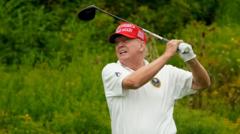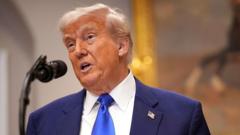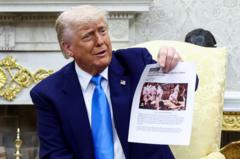Vietnam finds itself at a potentially precarious threshold as President Trump's latest tariffs loom, threatening to deepen economic tensions. While the U.S. leader has not yet directly targeted Vietnam despite a significant trade deficit, the Vietnamese Prime Minister seeks to navigate these challenges through diplomatic engagement, including an offer to "golf all day long" with Trump. This strategy mirrors that of former Japanese Prime Minister Abe, who successfully used personal relationships to secure favorable trade terms. However, analysts are skeptical about Vietnam's ability to sidestep the anticipated tariffs amid concerns over its deepening ties with China and the U.S. expectations for trade balance. As the tariffs await implementation, Vietnam’s diplomatic finesse, especially through initiatives like reducing tariffs on U.S. imports, will be tested in a broader context of global economic interplay.
### Can Vietnam Leverage Golf Diplomacy to Sidestep New Trump Tariffs?

### Can Vietnam Leverage Golf Diplomacy to Sidestep New Trump Tariffs?
As Trump prepares to impose new tariffs, Vietnam's diplomatic strategies come under scrutiny.
###
Vietnamese Prime Minister Pham Minh Chinh has sought a diplomatic rapport with President Trump amid impending tariffs that could threaten the country's economy. As Trump prepares to enact new tariffs, Vietnam aims to strengthen trade ties and reduce its trade surplus with the U.S., while counteracting growing concerns over the influence of China on its economy. Recognizing the historical precedent set by Japan’s Abe, who cultivated a personal friendship with Trump through golf, Chinh seems keen on leveraging similar tactics. With Vietnam's strategic decisions—including tariff reductions and facilitating investment in sectors like satellites—aimed at presenting a cooperative front, the effectiveness of such "golf diplomacy" remains uncertain, especially as global trade dynamics shift, heightening scrutiny over U.S.-Vietnam relations.
Vietnam's Prime Minister seems to adopt a diplomatic stance to mitigate the impact of new tariffs proposed by Trump. This approach, which includes engaging in potential golf diplomacy akin to Japan's former leader Abe, reflects a strategy to strengthen economic ties with the U.S. while balancing China's considerable influence on Vietnam's import and investment landscape. However, doubts linger over whether Vietnam can avoid the economic repercussions of Trump's intended tariffs as the geopolitical climate evolves.
Vietnam's strategic diplomatic dealings demonstrate an effort to stave off impending tariffs as it navigates its complex relationship with both the U.S. and China. Despite showing willingness to engage in positive trade interactions, the prime minister's golfing overture to Trump poses both an opportunity and a challenge as the actual impact of upcoming U.S. tariffs looms large on Vietnam's economy.
Vietnamese Prime Minister Pham Minh Chinh has sought a diplomatic rapport with President Trump amid impending tariffs that could threaten the country's economy. As Trump prepares to enact new tariffs, Vietnam aims to strengthen trade ties and reduce its trade surplus with the U.S., while counteracting growing concerns over the influence of China on its economy. Recognizing the historical precedent set by Japan’s Abe, who cultivated a personal friendship with Trump through golf, Chinh seems keen on leveraging similar tactics. With Vietnam's strategic decisions—including tariff reductions and facilitating investment in sectors like satellites—aimed at presenting a cooperative front, the effectiveness of such "golf diplomacy" remains uncertain, especially as global trade dynamics shift, heightening scrutiny over U.S.-Vietnam relations.
Vietnam's Prime Minister seems to adopt a diplomatic stance to mitigate the impact of new tariffs proposed by Trump. This approach, which includes engaging in potential golf diplomacy akin to Japan's former leader Abe, reflects a strategy to strengthen economic ties with the U.S. while balancing China's considerable influence on Vietnam's import and investment landscape. However, doubts linger over whether Vietnam can avoid the economic repercussions of Trump's intended tariffs as the geopolitical climate evolves.
Vietnam's strategic diplomatic dealings demonstrate an effort to stave off impending tariffs as it navigates its complex relationship with both the U.S. and China. Despite showing willingness to engage in positive trade interactions, the prime minister's golfing overture to Trump poses both an opportunity and a challenge as the actual impact of upcoming U.S. tariffs looms large on Vietnam's economy.






















